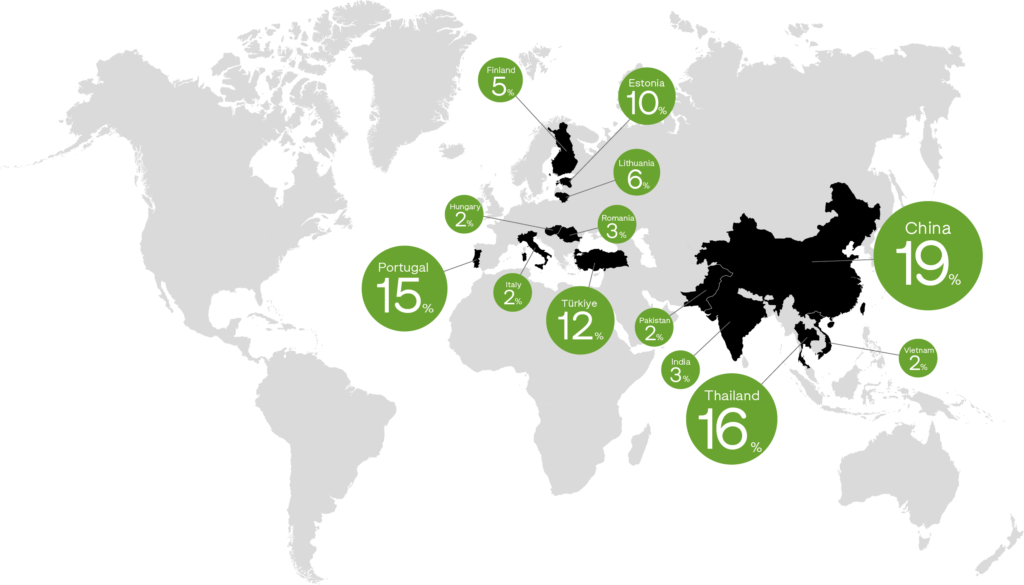Supply chains in the textile industry are complex and involve many actors. Consequently, enhancing transparency in the supply chain – from raw materials to the stores – demands patient work, both within our company and in cooperation with other actors in the sector. For transparency, we publish an annually updated list of our main partner suppliers. The content of the list is aligned with the requirements of The Apparel and Footwear Supply Chain Transparency Pledge and you can find it on our guiding principles page.
As part of our material strategy, we continuously increase sourcing of more traceable materials, including organic cotton and certified wool. Marimekko is a member of the global Leather Working Group initiative that is committed to building a more sustainable supply chain for leather. In addition, Marimekko began using traceable leather in its Imprint bag series. Marimekko is also certified according to the Responsible Animal Fiber certificate. This certification covers wool from sheep and alpaca as well as mohair, and it ensures animal welfare, responsible use of farmland, workers’ rights at the farms and the traceability of the certified material in the supply chain. Transparency is enhanced also by providing customers continuously with more information about the materials and production techniques used in Marimekko products.
Marimekko’s sourcing adheres to the principles of responsible sourcing. Read more on this website or Marimekko’s Year 2024 and its Sustainability Report.
Manufacturing countries and suppliers
Marimekko’s own printing factory in Helsinki prints all Marimekko fabrics sold by meter, as well as some of the fabrics used for kitchen textiles, clothing and bags. In addition, products are manufactured by our skilled partner supplier network in Europe and Asia. In 2024, 44 percent of sold Marimekko products were made in EU countries and the rest mostly in other European countries or Asia.

Good and competent suppliers play a major role in Marimekko’s competitiveness and we strive to build long-term partnerships with our suppliers. In 2024, our products were manufactured by a global network of around 150 partner suppliers. You can find a list of Marimekko’s partner suppliers on the guiding principles page.
With the help of skillful and diverse supplier network we can offer our customers a wide range of high-quality products. The goal of Marimekko’s sourcing is to find the most competent manufacturer for each product. Regardless of where our products are made, we want to ensure that they are manufactured in accordance with our values. We choose our suppliers carefully and, in our selection, in addition to commercial terms, we pay close attention to sustainability matters, such as working conditions, occupational safety and other human rights aspects.
As part of our material strategy, we have increased the share of traceable materials in our products, such as organic cotton and certified wool. Many material certifications, such as the Global Organic Textile Standard (GOTS) and the Global Recycled Standard (GRS), also include social requirements that all certified companies must meet. This way, they also help Marimekko to monitor the fulfilment of these criteria throughout our supply chain, but also contribute to improving the traceability of raw materials.
Our partner suppliers must report the origin of raw materials, such as cotton, annually or more often if necessary. The cotton we use, as an example, comes from different parts of the world, such as India, Brazil, the United States, Türkiye and Pakistan. We do not accept materials from very high-risk areas, and this policy binds all our suppliers.